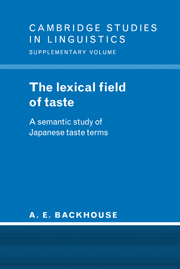Book contents
2 - Lexical meaning
Published online by Cambridge University Press: 06 January 2010
Summary
In this chapter we outline the approach to lexical meaning adopted in this study. This approach is basically that of the lexical semantic field, in particular as developed by Lyons in his work on lexical semantics (cf. Lyons, 1963; 1968: 400–81; 1977: 174–335). Broadly, the meaning of an item of the vocabulary is seen as being specifiable in terms of the various types of intralingual semantic relations which the item contracts with other items in the language, and in terms of its applicability to phenomena outside language (extralingual meaning).
The scheme described below constitutes the basic framework for the subsequent semantic analysis of Japanese taste terms. Intralingual and extralingual meaning are discussed in 2.1 and 2.2, respectively, while 2.3 briefly takes up some aspects of basic and extended meanings from the viewpoint of the present framework. 2.4 discusses the treatment of stylistic factors in the vocabulary.
Intralingual meaning
By intralingual meaning we refer to semantic relations which hold between lexical items in a given language.
Paradigmatic relations
Here we are concerned with semantic relations which hold between lexical items that can occur in the same linguistic context. Paradigmatic relations in general hold for a particular range of such contexts, rather than for the language as a whole.
Relations of this type rest upon the notion of implication holding between sentences containing the lexical items concerned. As a simple example, a sincere utterance of the sentence This apple is sweet will be held by speakers of English to imply the denial of the sentence This apple is sour, while no implication of any kind will follow with regard to, say, the sentence This apple is crisp.
- Type
- Chapter
- Information
- The Lexical Field of TasteA Semantic Study of Japanese Taste Terms, pp. 19 - 31Publisher: Cambridge University PressPrint publication year: 1994



